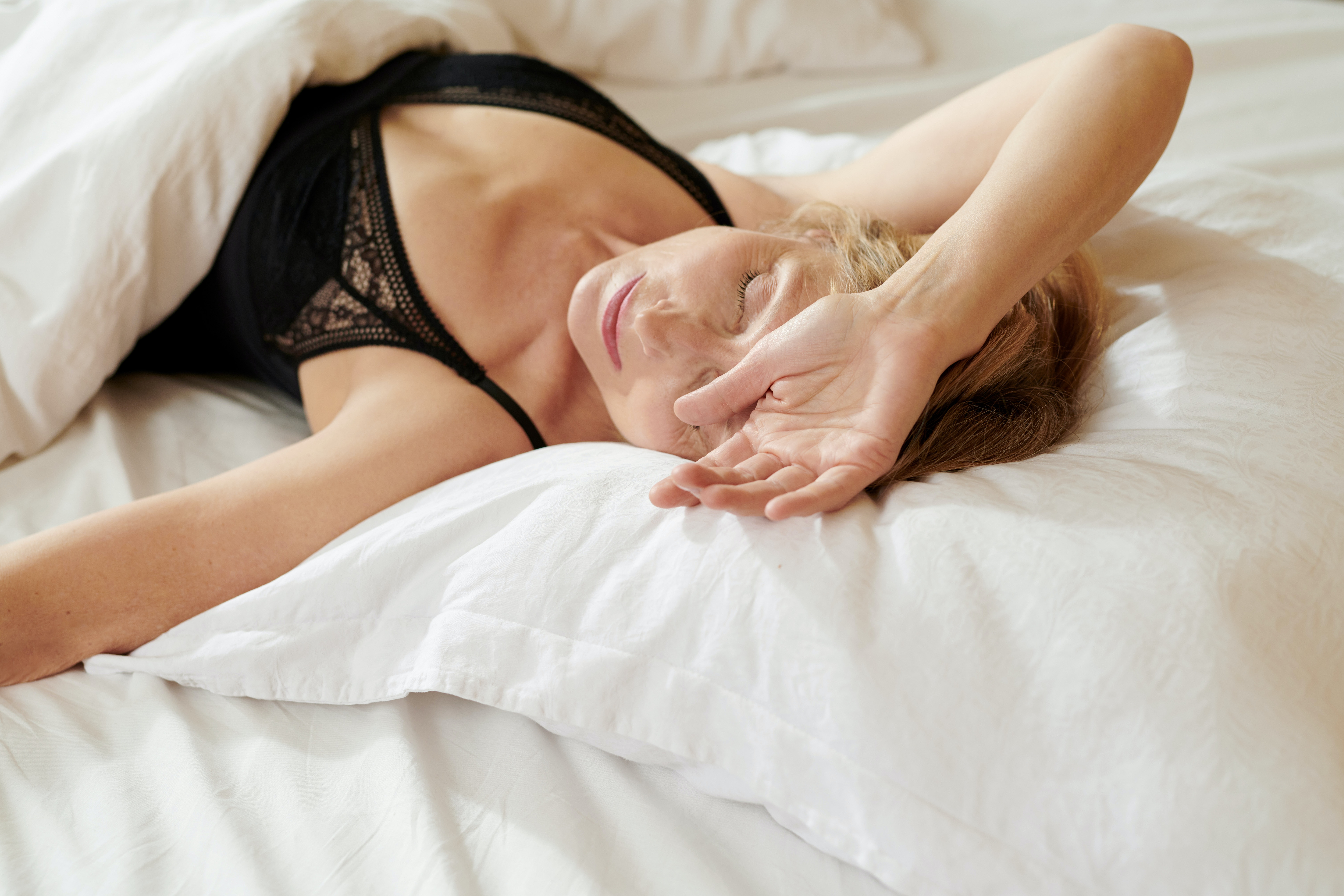get it now
free
Weight Loss Boosters Guide & Worksheet
This guide to 13 weight loss hacks is a single source for strategies to help you lose the last nagging 10 pounds or to get you started with insider knowledge about scientifically proven ways to lose weight (many you may not have heard before). You will feel empowered with the right information to help you reach your weight loss goal!
I help busy women lose weight and increase their energy so that they can do more fun things in life.
HI, I'M KRISTINE
DOWNLOAD MY FREE RECIPE BOOK
Need to lose weight? Grab this free recipe book to get you started!
DOWNLOAD FREE 10 WAYS
TO EXERCISE WITHOUT A GYM
Having trouble getting to the gym? Grab this free guide to help you get started exercising today!

Women and Sleep: Why We’re Different and How to Sleep Better
As a woman, you may experience sleep issues differently from men. It is not uncommon for most people’s sleep to become more challenging, especially as you age. However, women tend to experience unique circumstances that interfere with getting good sleep. Knowing what those are may illuminate your situation and give you a better understanding of potential causes. Identifying the causes may help you to address them and sleep better.
Getting a good night’s sleep is important for overall health and well-being. The National Sleep Foundation (NSF) recommends that adults ages 26-64 should get 7-9 hours of sleep per night. According to the Centers for Disease Control (CDC), adults over 40 in the U.S. sleep on average just over 7 hours per night. That is on the low end of the range.
Some research suggests that women over 40 may experience more sleep disruption and fewer hours per night of sleep versus men in the same age group. But why? What is unique to women?
Causes of Poor Sleep
The are several research studies explaining some of the causes, including:
- Hormonal changes during perimenopause and menopause can impact sleep. Things like hot flashes or night sweats can cause you to wake up in the middle of the night. See related article titled: “Understanding Perimenopause and Menopause”.
- Caregiver responsibilities especially for aging parents, tend to fall to women who reported more sleep disturbances as a result.(1)
- Women are more likely to report sleep disorders like insomnia and restless leg syndrome whereas men are more likely to suffer from sleep apnea(2)(3)
- Work-stress and burn-out is more common for women who are juggling work and family commitments. This can lead to anxiety and sleep disturbances.
- Other Lifestyle Factors include consumption of alcohol and smoking. They can cause interrupted and shortened sleep. Women reported(4) engaging in these activities more often than men.
Okay, so now you have an idea why women, especially those over 40, may experience poorer sleep than men of the same age. Hence, you might ask, why does it matter?
Health Risks of Poor Sleep
Not getting enough sleep matters, because there are some health risks of not getting the recommended 7-9 hours of sleep each night.
- Being overweight and obese was more likely for those who slept less than the recommended amount.(5) Hormones such as leptin and ghrelin are directly related to how hungry or satiated we feel.(6) The hunger hormone, ghrelin, was higher and the satiety hormone, leptin, was lower in those who did not get enough sleep.(7) Having your hunger hormone be higher and your satisfied hormone lower, is essentially a double hit for your ability to regulate appetite.
- Decreased cognitive function occurs when you don’t get enough sleep.(8) Short-term impairment is common the next day after a night of interrupted sleep. Longer term risks of chronic poor sleep has been linked to Alzheimer’s and other forms of dementia.
- A lowered immune system results after a poor night of sleep. As you sleep, your body produces protective cytokines to fight infections. If you don’t get a good night of sleep, you awake in the morning with fewer cytokines. That means you are less able to stave off invaders.(9)
Ok, so all of that is not optimal. What can you do if you are not getting enough, or quality sleep each night? Some recommendations for better sleep are next.
Recommendations for Better Sleep
Here are the top recommendations by sleep experts like Dr. Matthew Walker, neuroscientist, sleep expert, and author of the book “Why We Sleep: Unlocking the Power of Sleep and Dreams.“:
Follow a consistent sleep schedule: Go to bed and wake up at the same time every day, even on weekends. This can help to regulate your body’s natural sleep-wake cycle.
Create a relaxing bedtime routine: Establish a relaxing bedtime routine. It can help you wind down and signal to your body that it’s time to sleep. This could include taking a warm bath, reading a book, or practicing relaxation techniques such as deep breathing or meditation.
Create a sleep-friendly environment: Keep your bedroom dark, cool, and quiet, and use a comfortable mattress and pillows. Avoid screens (such as TVs, phones, and computers) for at least an hour before bed. Blue light emitted by screens can disrupt your body’s natural sleep patterns.



Avoid caffeine and alcohol: Caffeine and alcohol can disrupt your sleep. Try to avoid consuming them, especially within 3 hours bedtime. Some people metabolize caffeine and alcohol better than others. However, Dr. Walker says even for those people, caffeine can decrease the quality of sleep reducing deep sleep. The result is that you don’t wake up feeling as refreshed.
Exercise regularly: Regular physical activity can help you improve sleep quality. Just be sure to finish your workout a few hours before bedtime to allow your body time to wind down.
Manage stress: Stress and anxiety can make it difficult to fall asleep and stay asleep. Try relaxation techniques, such as deep breathing or meditation. Also look for healthy ways to manage stress, such as exercise or talking to a friend or therapist.
Eat a healthy diet: A balanced diet that includes a variety of fruits, vegetables, whole grains, and lean protein sources can help to improve sleep quality. Avoid eating at least 3 hours before bedtime to avoid digestive discomfort and also improve sleep quality.



Other Sleep Considerations
Women over 40 should pay attention to hormonal changes that occur in perimenopause and menopause, which can disrupt sleep. Talk to your doctor if you think hormone fluctuations are interfering with your sleep.
There are some natural supplements that have some research(10) showing benefit for sleep. They are melatonin or valerian root, but further research is still needed.
However, if you are still struggling with sleep, despite trying these strategies, it may be helpful to speak with a healthcare professional or a sleep specialist. They can help to identify the underlying causes of sleep problems and recommend additional treatment options if needed.
Sources:
- “How Adult Caregiving Impacts Sleep: a Systematic Review” by Eeeseung Byun, RN, PhD, Anners Lerdal, RN, PhD, Caryl L. Gay, PhD, and Kathryn A. Lee, RN, CBSM, PhD https://www.ncbi.nlm.nih.gov/pmc/articles/PMC6508862/
- “Gender differences in sleep disorders” by Vidya Krishnan and Nancy A Collop https://pubmed.ncbi.nlm.nih.gov/17053485/
- “Gender Differences in Obstructive Sleep Apnea and Treatment Implications” by Christine M. Lin,,Terence M. Davidson, and Sonia Ancoli-Israel https://www.ncbi.nlm.nih.gov/pmc/articles/PMC2642982/
- Gender Differences in the Epidemiology of Alcohol Use and Related Harms in the United States; Part of the Topic Series: Women and Alcohol by Aaron M. White National Institute on Alcohol Abuse and Alcoholism, National Institutes of Health, Bethesda, Marylandhttps://arcr.niaaa.nih.gov/volume/40/2/gender-differences-epidemiology-alcohol-use-and-related-harms-united-states
- Sleep deprivation and obesity in adults: a brief narrative review by Christopher B Cooper, corresponding author Eric V Neufeld, Brett A Dolezal, and Jennifer L Martin https://www.ncbi.nlm.nih.gov/pmc/articles/PMC6196958/
- “Physiology, Obesity Neurohormonal Appetite And Satiety Control” by Anthony Y. Yeung; Prasanna Tadi. https://www.ncbi.nlm.nih.gov/books/NBK555906/
- “3 ways decreased sleep contributes to overeating” by Harvard School of Public Health https://www.hsph.harvard.edu/obesity-prevention-source/2010/01/01/3-ways-decreased-sleep-contributes-to-overeating-2/
- “How Lack of Sleep Impacts Cognitive Performance and Focus by Eric Suni https://www.sleepfoundation.org/sleep-deprivation/lack-of-sleep-and-cognitive-impairment
- I’m having trouble sleeping lately. Does this increase my chances of getting sick? By Eric J. Olson, M.D. https://www.mayoclinic.org/diseases-conditions/insomnia/expert-answers/lack-of-sleep/faq-20057757
- “Valerian root vs. melatonin for sleep” by Jenna Fletcher https://www.medicalnewstoday.com/articles/valerian-root-vs-melatonin
Leave a Reply Cancel reply
ABOUT
connect with me
contact
Disclaimer: The information on this website is for educational purposes only. It is not medical nor professional advice. Please consult your doctor or other health professional before implementing any information found on this website. Click here to view the full disclaimer in our terms and conditions of use policy.
leave a comment